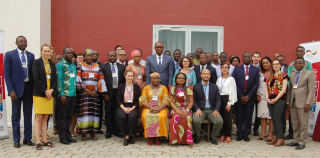
Posted by Quentin Gouzien[1]
To achieve the sustainable development goals (SDGs), it is essential that the State allocates enough budgetary resources towards the sectors contributing to their achievement, as underlined by a recent IMF study. As shown by the experience of the millennium development goals (MDG), the inclusion of the SDGs in long-term development plans is not enough. It must also be ensured that the State budget takes the SDGs into account.
However, there is currently no international methodology for integrating SDGs into public budget processes. Therefore, many decisions have to be made by each country during this process, depending on the context and the PFM system in place. In contrast to some well-known examples such as Mexico, African experiences are largely undocumented.
In this context, a workshop was organized in January 2020 by the Ministry of Finance of Benin, with the technical and financial support of the German cooperation (through GIZ), to share experiences of eight African countries. The seminar gathered in Cotonou around sixty participants from Benin, Burkina Faso, Cameroon, Ghana, Mauritania, Mozambique, Namibia, and Senegal, as well as experts from the Global Initiative for Fiscal Transparency (GIFT), the Public Expenditure and Fiscal Accountability (PEFA) Secretariat, and several GIZ projects based in the same African countries, in South Africa and Germany.
The first day was dedicated to the systematic integration of SDGs into the State budget. The countries represented are at very different stages. While many have not yet started the process, some are in the design or testing phase, notably Benin, and few countries, such as Ghana, have already developed a functioning system to identify and track public expenditures contributing to the different SDG targets.
The second day focused on the integration of specific development goals, particularly SDG 5 (gender equality). More countries have made progress in developing initiatives and tools in this area. However, some challenges remain: for example, the lack of indicators disaggregated by sex, lack of political will and poor coordination between government agencies. An integrated and multisector approach is missing. Useful analytical tools such as the GIZ Equity Budgeting Tool and the new PEFA Gender Responsive Budgeting Framework were also presented.
From the lessons learnt during this workshop, five main recommendations are addressed to countries wishing to integrate the SDGs in their State budget.
- Integrate the SDGs at all stages of the budget cycle: SDGs should be considered during budget preparation (preferably before final budget allocations are made), budget execution, monitoring (using performance indicators) and the audit phase. Existing PFM mechanisms can be adapted for this purpose.
- Take into account the interlinkages and indivisibility of the SDGs: although some SDGs may be used as pilots and cross-cutting SDGs may require special attention, all SDGs and their linkages need to be included. Thus, one budget line can contribute to several SDG targets at the same time.
- Use all available information at an appropriate level of detail: to establish the links between the budget and the SDGs, a relatively detailed budget classification (policy objectives, activities or actions) should be used, which includes the SDG targets, perhaps broken down into sub-targets. A classification by spending program, which is being implemented in many African countries, is particularly appropriate.
- Coordinate the process with all stakeholders: sector ministries, the legislature, the external audit agency, civil society groups, and local authorities. Discussions and possibly negotiations with these groups may be required, and the government will need to initiate awareness-raising and training activities.
- Institutionalize the integration of the SDGs in countries’ legal framework, business processes, and information systems (FMIS): budget circulars and budget documentation may also need to be changed, and new reports prepared on countries’ progress in implementing the SDGs.
[1] Technical Advisor in the GIZ project “Macroeconomic Advice for Poverty Reduction” in Benin, led by Svenja Ossmann. This article reflects the author’s views, not necessarily those of GIZ.
Note: The posts on the IMF PFM Blog should not be reported as representing the views of the IMF. The views expressed are those of the authors and do not necessarily represent those of the IMF or IMF policy.






